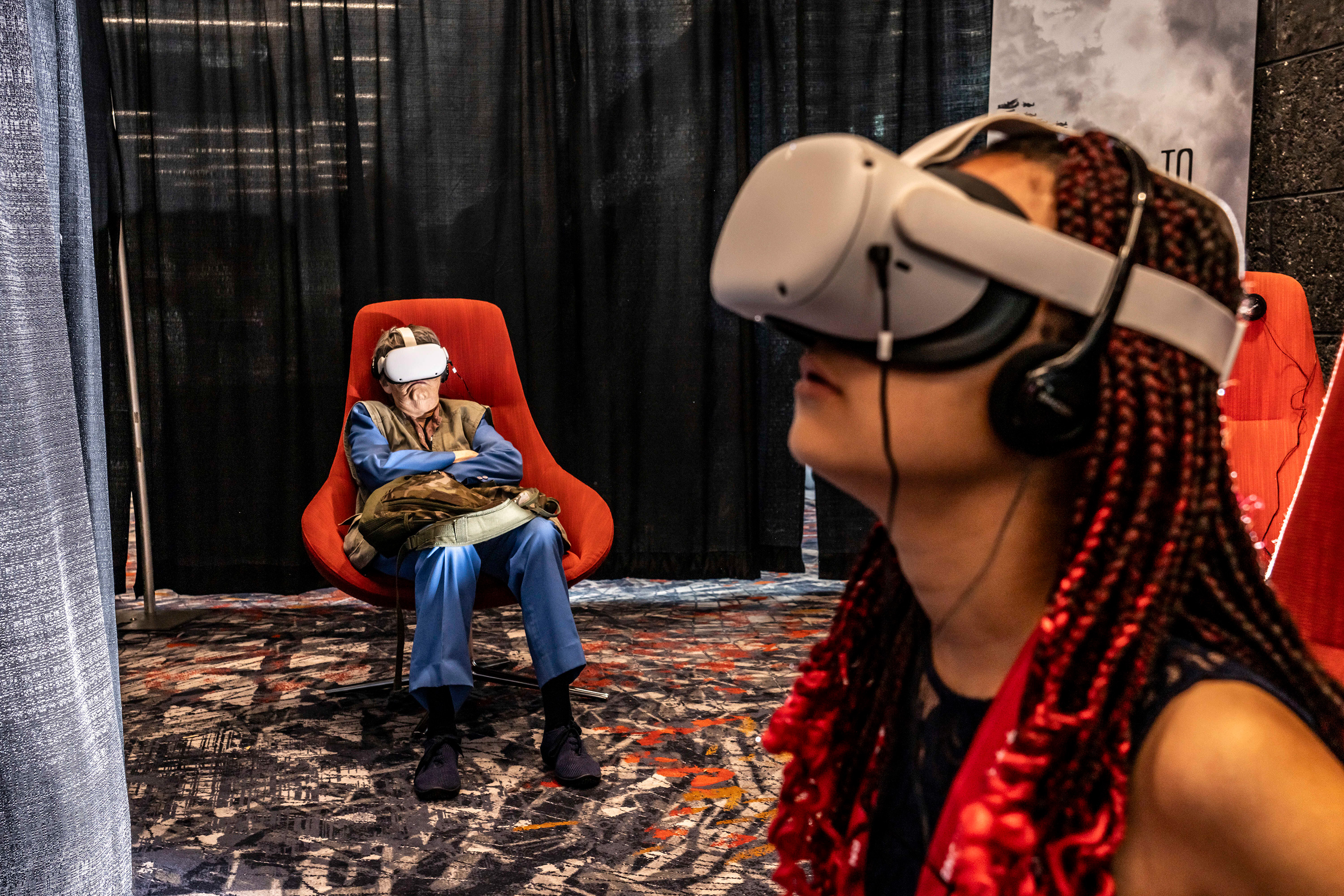Evgeny Morozov reads a lot more than you and I do. He has spent the last few years sequestered in an untouristed patch of the European continent hoovering up theory, penning a magnum opus (in which technology meets capitalism meets ideology), and learning a dozen languages. Soon enough (in summer ‘26, I believe) FSG will unleash the book on the world. Should that prospect excite, and I anticipate it will, note that Morozov’s spiky essay for The Ideas Letter this week defines a new class, the “oligarch-intellectual”—and is an early warning sign of things to come.
I asked David Runciman, our other commissioned author, to make intellectual sense of his professional pivot. After a quarter century as a Cambridge don, Runciman tossed away his chair in politics and joined the more modish world of fulltime podcasting. Runciman explains what his transition says about the novel forms by which information is transmitted and received.
Our curated content begins with a stunning essay from the law professor Julie E. Cohen, which follows, in a way, from Morozov’s commissioned contribution. Cohen takes aim at the class of tech oligarchs and traces the origins of their power. You’ll notice her play, of course, on the classic Robert Nozick text. We follow with a fascinating story of Keynesian thinking à la polonaise: Małgorzata Mazurek, a historian at Columbia, discusses, in a taped lecture, two progressive interwar Polish economists and their unlikely intellectual journey.
Next up is an Aeon profile of the South Korean Heideggerian thinker Byung-Chul Han. In his critique of digital capitalism, the psychoanalyst Josh Cohen provides a broad assessment of both Han’s philosophical contributions and his limitations.
Last is a podcast that spotlights what’s next for the Kurds of Syria after Assad’s demise, after Öcalan’s disarming. Can the autonomously governed Rojava region, with its direct democracy mechanisms, be a model for a future state?
Our musical selection for Ideas Letter 37 is majika music performed by the Mozambiquan band Ghorwane: Soukous hooks and horn-like voices with a dollop of Angolan merengue.
—Leonard Benardo, senior vice president at the Open Society Foundations
The New Legislators of Silicon Valley

Evgeny Morozov
The Ideas Letter
Essay
Morozov describes a newly emerged Silicon Valley class of “oligarch-intellectuals,” billionaire tech elites who combine vast wealth, ideological ambition, and the philosophical pretense to reshape public policy, culture, and even geopolitical strategy according to their vision. Unlike previous intellectuals, who debated ideas, these figures interpret technological trends as inevitable truths and then legislate them into reality through investment, media control, and political influence.
“Reality, however, maintains its breaking point—a lesson Soviet bureaucrats learned when their carefully constructed fictions shattered against material constraints. The Chinese Communist Party, shrewder in its methods, built multi-tiered grievance collection systems—digital forums, local officials, vetted NGOs—delivering crucial intelligence about potential turmoil. … The oligarch-intellectuals demonstrate precisely the opposite instinct: They are treading the Soviet path. Musk’s DOGE apparatus converts remaining employees into nodding mannequins, while his cohort hunts dissenters across digital platforms with algorithmic efficiency. In selecting Soviet-style reality denial over Chinese-style reality monitoring, they’ve fashioned echo chambers that will ultimately fracture their grand designs.”
Podcast University

David Runciman
The Ideas Letter
Essay
The popularity of podcasts evinces a strong public appetite for traditional academic content—belying concerns that universities’ pedagogical methods are outdated. Runciman contends that podcasting preserves the essence of lectures and other established forms of intellectual learning and that it provides deep educational value in a more personal, informal, and less patronizing format than is generally found in academia. Still, he argues, it cannot replicate the sustained interpersonal engagement and critical rigor that university environments uniquely provide.
“Podcasting works best when people feel like they’re listening in to a conversation rather than being talked to, never mind at. It is a remarkably intimate medium. But for just that reason it is well suited to the most serious and demanding forms of conversation: The intimacy carries the listener along. And it suits forms of communication that are not really a conversation at all. The most successful podcasts I have ever made were nothing but lectures. … But this only worked for two reasons. First, there was no suggestion that these were lectures. They were just chats. Second, I put away my notes and simply talked. The subject was political philosophy, but I tried to make each episode more like a story and less like an explanation. The paradox of podcasting is that there’s a huge demand for what universities do so long as it doesn’t come across as the sort of thing universities do.”
Oligarchy, State, and Cryptopia
Julie E. Cohen
Fordham Law Review
Journal Article
Cohen, a legal scholar at Georgetown, argues that the concentration of immense power in the hands of tech companies represents a new and urgent form of oligarchy, one rooted not just in wealth but in their control over digital infrastructure and legal-political systems. These tech elites are reshaping global power structures. They are not merely seeking regulatory capture for profit: Their ambitious projects, from artificial intelligence to space colonization, are not fantastical forays but strategic efforts to dismantle existing institutions and design a future governed by their own interests and ideologies.
“The ongoing debates about global tech platform companies, state authority, and networked power, however, typically do not give systematic attention to the phenomenon of oligarchy—to extreme concentrations of material wealth deployed to obtain and protect durable personal advantage. Popular and press accounts of the power of “big tech” tell a different story. The biggest tech companies are dominated to a singular extent by a small group of very powerful and extremely wealthy men who now wield unprecedented informational, sociotechnical, and political power. Those men have increasingly espoused an activist political agenda directed toward advancing their views about the importance of unfettered technological development. At the same time, though, they also have played uniquely influential roles in structuring technological development—and, more recently, government reorganization—in particular ways that align with their personal beliefs. Developing an account of oligarchy and, more specifically, of tech oligarchy within contemporary political economy has become a project of considerable urgency.”
Economics of Hereness
Polish Origins of Global Developmentalism
Małgorzata Mazurek
Watson Institute for International and Public Affairs
Video
In a guest talk at Brown, Mazurek, an associate professor of history at Columbia, shows how the roots of modern development theory emerged from the political upheavals and nation-building efforts of the interwar period in Poland. She describes how the country’s economists leveraged its liminal status between the industrialized West and colonized regions to craft inclusive economic models aimed at multiethnic integration. Her book reframes development theory as a deeply situated, political, and transformative project.
“Development is often imagined as planning for the other, but at its roots, if we think about development from the perspective of Eastern Europe, it was a local knowledge for local people, not for some remote destinations. And I look in this story at people who sought to improve living conditions for the entirety of Poland’s population, which consisted of a multi-ethnic mass of people. Poles, ethnic Poles, but also Jews, Ukrainians, Belarusians, Germans, and people who in the early 20th century didn’t know who they were in terms of their national belonging. And I call a set of theories and policies designed for the multi-ethnic Polish society as true employment developmentalism.”
The Winter of Civilisation
Byung-Chul Han’s relentless critiques of digital capitalism reveal how this suffocating system creates hollowed-out lives
Josh Cohen
Aeon
Essay
According to Cohen, a psychoanalyst, the philosopher Byung-Chul Han criticizes digital capitalism as a system of insidious self-exploitation that erodes meaningful experience by replacing contemplative depth with constant stimulation, transparency, and performative positivity. It creates an “achievement society” in which individuals internalize the demand to optimize themselves and in the process risk burnout, hollowed-out subjectivity, and the collapse of trust, love, and aesthetic experience into commodified, surface-level interactions. For Cohen, even as Han does offer a glimpse of utopian alternatives rooted in contemplative stillness and “Far Eastern” philosophical notions of emptiness, he displays a relentless negativity that could reproduce the very absolutism he criticizes.
“The thrust of Han’s writing is, above all, philosophical. Social and cultural life are occasions for addressing metaphysical questions. As such, the surface symptoms of digital culture are secondary to its ontological premises. Like Martin Heidegger, on whose concept of ‘Stimmung,’ or mood, he wrote his 1994 PhD thesis (as well as a 1999 introduction to Heidegger), he seeks to unearth the underlying metaphysics of our present-day culture. In particular, and again like Heidegger, Han is concerned with how the environment of a hyper-accelerated culture conditions the fundamental relationship between consciousness and the world. … The Burnout Society crystallised the critique of the self-exploitative logic of contemporary capitalism that Han has been elaborating ever since.”
Rojava After Assad: Where Next for the Kurdish Struggle?
With Elif Sarican
Richard Hames
Novara FM
Podcast
Sarican, an anthropologist and Kurdish activist, explores the Rojava revolution in northeastern Syria as an ongoing experiment in radical democracy, women’s liberation, and antistate socialism, rooted in community self-organization and collective governance. For her, the revolution is a process of continual transformation shaped by Kurdish political thought, anti-colonial theory, and thinkers like Abdullah Öcalan and Murray Bookchin, but that is not reducible to any single ideology. Despite military threats from Turkey, remnants of ISIS, and new power players like Hayat Tahrir al-Sham, the Sunni Islamist group that runs Syria’s interim government, the movement persists through grassroots justice systems and dual-power structures, striving for deeper social change.
What does the direct democracy look like? Now, it’s interesting because the movement has never really called it direct democracy, it’s always called it radical democracy. It’s slightly different in a way where it’s a radical, and radical in the literal sense of the term, to the root of it, a radical democracy in terms of understanding what it means for people to take charge of their own lives, but in a collective sense, not in an individual sense. The precursor, the condition, and the continued guarantee of that being women’s liberation. What that looks like in practice is, obviously, decision-making.
